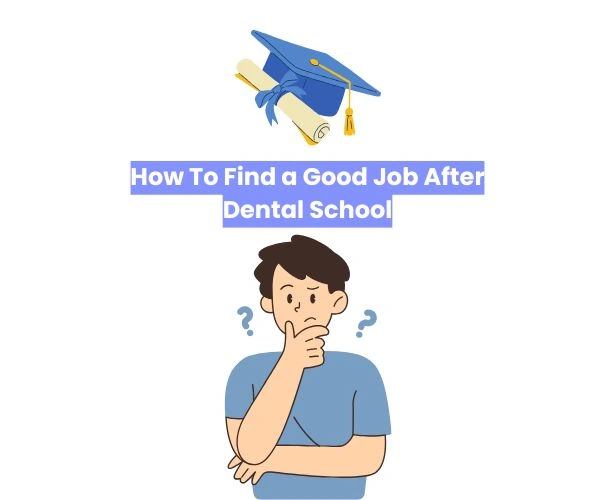Graduate Dentist Job Hunt: How to Find the Right Role
How to find a dental job after graduation can be an exciting yet stressful step. You’ve finally finished your years of hard work, and it’s time to enter the real world. It can be overwhelming, but it doesn’t have to be.
In today’s blog; How to Find a Dental Job After Graduation, we will talk about all the entry-level dentist positions we work through all the steps of dental job hunting with confidence. From the best job platforms to how to think, structure your applications, it will deliver a straightforward path to those starting over.
Where to start from?
Before you start sending out resumes, you need to understand how the dental job market looks from the standpoint of a new graduate. Many dental practices actively offer entry-level dentist positions to candidates who demonstrate strong clinical skills, effective communication, and a willingness to learn. This presents a great opportunity for fresh talent to get their foot in the door and gain hands-on experience in the field.
As a new graduate, your experience may vary among private practices, group dental offices, public health clinics, or corporate dental chains. Once you know where your strengths and passions are, you can focus on finding the right employer.
How to find a dental job after graduation?

Getting your career in dentistry off the ground can be daunting, but by following the right steps, you can get your first job with confidence. Here’s what to do to get a dental job after graduation and impress prospective employers:
1. Begin by Learning about the Job Market
Research national and local trends in dentistry and determine what areas are in demand before submitting applications. This will enable you to focus on areas that offer more entry-level dentist jobs.
2. Take Advantage of Dental Job Boards for New Graduates
Websites such as DentalPost, iHireDental are top-notch dental job boards for new graduates. These websites frequently post jobs specifically designed for recent dental school graduates.
3. Network with Faculty and Mentors
Speak with your professors, clinic supervisors, and alumni. They usually have contacts and information on how to get a dental job after graduation through referrals and word-of-mouth connections.
4. Attend Dental Career Fairs and Conferences
Most dental associations sponsor career fairs that feature entry-level dentist job opportunities. These career fairs enable you to get face time with hiring managers and find out about practices that are recruiting new grads.
5. Refine Your Resume and Cover Letter
Customize your resume to emphasize clinical rotations, volunteer work, and any specialty training. Incorporate keywords such as “entry-level dentist” so that your resume gets noticed on job boards and in applicant tracking systems.
6. Interview at Group Practices and DSOs
Dental Service Organizations (DSOs) and larger offices usually have organized onboarding processes for new grads. They typically post entry-level dentist jobs acceptable for new grads.
7. Be willing to take on Temporary or Part-Time Positions
If permanent jobs are not right away available, temping or part-time work are good options. This gains experience and can result in permanent jobs later.
Best Platforms to Find Dental Jobs as a New Graduate
When beginning your dentist’s job search, there are some job boards you should avoid if you are trying to find a graduate dentist job. Instead, use specific platforms and networks geared towards dental professionals. Here’s where to look most productively:
Dental Job Boards / Niche Sites
Niche job boards like DentalPost, iHireDental, and DentistryIQ have job listings adjusted in scope for dentists, hygienists, and dental assistants alike. These sites let you filter for a job by type, location, and experience level.
American Dental Association (ADA)Career Center
For job openings working directly with patients, you can also visit the ADA Career Center. It is a reliable and trusted resource for both recent graduates and experienced dentists.
LinkedIn and Networking
LinkedIn isn’t only for corporate types. By creating a profile and networking with other dental professionals, you are able to find opportunities that are not listed anywhere else. Join necessary dental groups and reply to posts from practices: Hiring graduates.
Dental School Career Services
Do not forget about your dental school’s career center. They frequently have direct connections with local clinics and hire alumni. Career coaches can also assist you in fine-tuning your resume and interview skills.
Effective dentist job search tips

Your application is your one shot. It needs to demonstrate your clinical skills, academic accomplishments, and it needs to show off your passion to work with patients and to be a team member. Here are some of the dentist job search tips that will help you:
1. Job Resume for Graduate Dentists
- Focus on clinical rotations, externships, and patient care experiences.
- Add any applicable certifications.
- Enumerate leadership positions held in dental school clubs or events.
- Bullet it for an easy-to-read and powerful impact.
2. Prepare a Tailored Cover Letter
Avoid generic templates. Customize your cover letter for each position by:
- Including the name of the clinic, and also if there were any news stories or reviews you’ve just seen.
- Telling them why you’re excited to work there.
- Understanding how your qualifications directly line up with their needs.
3. Portfolio and Case Studies (If Applicable)
If you have a portfolio or case presentations from dental school, include them as optional attachments. This shows confidence and your ability to manage real-world dental cases.
4. Be Prepared and Professional for the interview
Once your application is noticed, then comes the interview, a critical moment that can make or break your chances of getting the job.
- However, it’s conducted by phone, Zoom, or in person; preparation is crucial. Begin by researching the clinic well- know what they offer, who the team is, and what their mission is.
- This not only helps you to frame your answers correctly, but also demonstrates real interest in their practice.
- Practice responding to questions you’re likely to hear at interviews, like “Why do you want to work here?”, “How do you deal with anxious patients?”, and “How do you keep current with new developments in the dental field?” These types of questions help interviewers assess your attitude and how prepared you are for the job.
- Lastly, don’t forget to ask good questions focused on mentorship opportunities, career pathing, and the clinic’s impact culture. Talking back makes you look professional and shows a sliver of maturity and a long-term commitment to the position.
5. Build a Network: Connections Open Doors
Networks have a way of leading to jobs that don’t ever appear online. Reach out to:
- Your dental school’s alumni.
- Teachers and professors, many with ties in the industry.
- Dental conferences are an excellent opportunity to meet professionals in person.
- Facebook or WhatsApp dentistry groups; these casual forums are unexpectedly effective.
6. Consider a Dental Residency or Volunteer Program
Don’t panic if job offers aren’t coming through as quickly as you anticipated. Participating in a residency program or becoming a dental volunteer can only strengthen your resume and better your chances of employment in the future.
The programs, such as AEGD (Advanced Education in General Dentistry) or GPR (General Practice Residency) can give you an upper hand here, and you can further sharpen your skills in a monitored atmosphere.
Certifications That Help

Additional certifications can help during your graduate dentist job hunt. Consider short courses in:
- Invisalign or clear aligner therapy
- Digital dentistry tools
Laser dentistry - Oral sedation techniques
Conclusion: Dental Jobs for New Graduates
Embarking as a dentist is an exciting career! Although the process of the graduate dentist job hunt can be overwhelming at first, a solid plan and the best tools will ensure a smooth, rewarding experience.
From industry-specific job boards to killer applications, networking and leaning in, or keep pushing yourself to learn what you don’t know, these steps get you closer to your dream role.
Need more tips and resources? Subscribe to our blog for career advice tailored to new dental grads. As a leading graduate dentist recruitment agency, we also share insights on job interviews, resume writing, and salary trends.
FAQs; Entry Level Dentist Positions
If you still have any doubts related to the dentist job hunt or dentist job search tips so here are some FAQs to give you a clear understanding of it:
Q1. When should I start applying for jobs before graduation?
A: Begin to work 3–4 months before graduation. This allows for time to consider options, prepare for applications, and interview.
Q2. What are some examples of a dental work resume?
A: This includes education, work experience, certifications, licenses, and any leadership or research positions.
Q3. Can I build my resume with no experience?
A: Yes! There are a lot of clinics that are willing to hire a new grad, especially if you show you’re eager to learn and have a good attitude.
Q4. How can I negotiate my first dental job offer?
A: Find out what the local salaries are and then take into account the overall package (benefits, bonuses, mentoring, room to grow) before sitting down and having that conversation with respect.
Q5. Do you need a cover letter?
A: Yes, A well-crafted, tailored cover letter demonstrates effort and can make you stand out.
Q6. How do I search for entry-level dentist jobs online?
A: You can also look for entry-level dentist jobs on dental career boards for new grads, such as iHireDental and DentalPost. These websites usually list jobs, especially for new grads.
Q7. Is it more advantageous to work in a private practice or for a DSO as a new grad?
A: Both have advantages. DSOs frequently provide mentorship and formal training schemes for graduates, whereas private practices may involve more individualized experience. Think about your learning style and ultimate goals.
Q8. How do I stand out when applying for graduate dentist jobs?
A: Customize every application, put a heavy emphasis on a strong dental portfolio if possible, and utilize keywords such as “entry-level dentist positions” when applying through online job sites. Showing enthusiasm and the desire to learn also pays off.
Related article: How Much a New Graduate Dentist Makes





